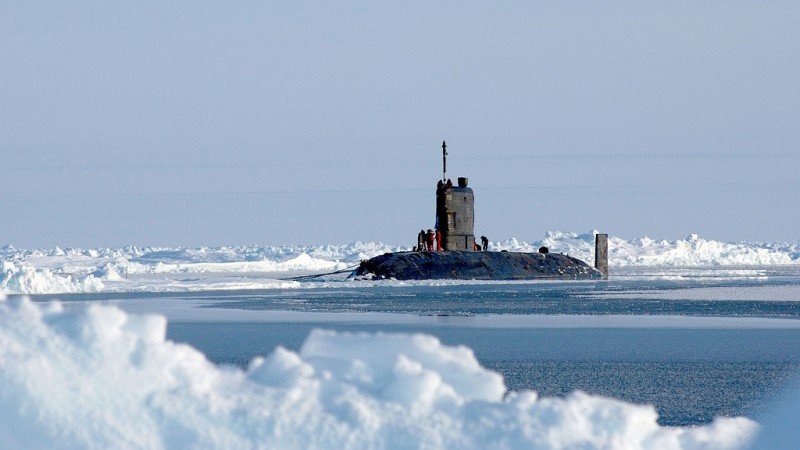“Nothing is more dangerous than for a seaman do be grudging in taking precautions lest they turn out to be unnecessary,” admonished Admiral Chester Nimitz.
He was surveying the aftermath of the second deadliest episode for the US Navy after Pearl Harbor. In an egregious failure of weather forecasting, Task Force 38 sailed into the heart of a typhoon in 1944, losing three ships and 790 lives.
David Titley, rear admiral turned academic at Penn State University, invokes that memory in a call for climate change preparations in today’s military.
Speaking at Columbia University during Climate Week NYC, Titley does not need to convince the students that global warming is real, human-caused and a threat.
The security establishment, too, is steadily getting to grips with the potentially destabilising effects of sea level rise and weird weather – only last week, the National Intelligence Council published a briefing on the topic.
NEW: @WhiteHouse issues order to all agencies to consider #climate "in the development of national security doctrine, policies, and plans"
— Climate Home News (@ClimateHome) September 21, 2016
Based on that briefing, President Barack Obama ordered around 20 federal agencies to consider the impacts of climate change in national security policy.
Could this be the framing of the climate threat that finally engages sceptical Republicans?
Bob Inglis, a former Republican congressman who now campaigns for “free-enterprise solutions to climate change”, thinks it has merit.
“The conversation with climate change started in a particularly bad place. The godless scientist got together with the blue-helmeted UN people and came up with a cap and tax system that would have rewarded Wall St insiders and traders. There’s nothing in that paragraph yet that’s attractive to conservatives,” he tells Climate Home.
“If it had been a conversation that had been started by the US military, we’d be in a very different place. If the military had come and said ‘when Baton Rouge gets flooded with a thousand year flood event that are going to be happening more and more, it’s going to take a lot of resources. Do we really want to do this? Don’t we want to head this off?'”
Report: Trump denies saying climate change was Chinese hoax (he did)
But we are where we are, with climate scepticism deeply engrained in Republican cultural identity. It is politically risky for a right-winger to take on this issue, as Inglis found out the hard way. He was unseated in the 2010 primary after saying conservatives should go with the science and advocating a carbon tax.
As Titley puts it: “Now he [Inglis] is a climate martyr and he gets all kinds of awards for being a climate martyr, but he would really like to have his job back.”
With 32 years of service, a lifelong obsession with the weather and a story to tell about overcoming his own climate scepticism, Titley is a compelling messenger. His talk is peppered with relatable anecdotes, like the time his home was smashed up in a coastal storm surge, as well as graphs and strategic insights.
He compares his approach to assessing the evidence on climate change to the old days of navigating the oceans with pencil and paper charts. “You look at all the data, but you don’t trust any one piece of data 100%,” he says.
#Climate wars: is the #Sahel the first battle zone? Analysis from @jubberstravels #UNGA https://t.co/iiNNegPk8q pic.twitter.com/dGZ21q5RIs
— Climate Home News (@ClimateHome) September 24, 2016
When he saw the data on Arctic ice loss and put that together with his understanding of the strategic importance of the North Pole, it added up to something his bosses should be worried about.
“The ice doesn’t see this as a political issue, the ice doesn’t care who votes or whatever, the ice just melts, it obeys the laws of physics – and we have understood those for many, many decades,” he says.
The navy forecasts ships will be able to cross the North Pole for two weeks a year from about 2025. It provides new opportunities for trade, but also an arena for geopolitical jostling, among those countries equipped to deal with hostile Arctic conditions.
For example, Titley observes that Russia increased its forces in the Arctic in response to sanctions imposed over its invasion of the Crimea. “We don’t know in 20 years, let alone 30 years, who is going to be our friend and who is going to be our adversary. But we know that if the president says: I want to project power or protect shipping, you want to be in a position to do it.”
Weekly briefing: Sign up for your essential climate politics update
Titley presents his findings to everyone from military chiefs to Rotary Clubs. “My experience when talking to Republicans off the record is that most of them understand [climate change risks] but they also understand the politics. As you get closer to being on the record or a hearing setting, you would get more pushback.”
A military background does not put him above conservative criticism. One objection is that Obama is not providing any extra funding to back up this agenda, which Titley expresses some sympathy for. The other main response is to play “rank the threat”, which he rejects.
“Are you trying to tell me climate change is more important than fighting ISIS? That is a false choice. We do ourselves a grave disservice if we don’t look down the lines at the rising risks.”
The discourse may be starting to shift, but a few security reports alone can’t mend the fences after decades of partisan posturing.
So Titley encourages ordinary people to let representatives know if they are concerned: “We have got to, through advocacy and other ways, make this politically a less high risk thing.”
